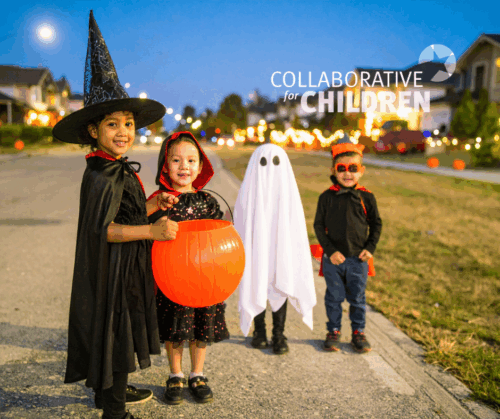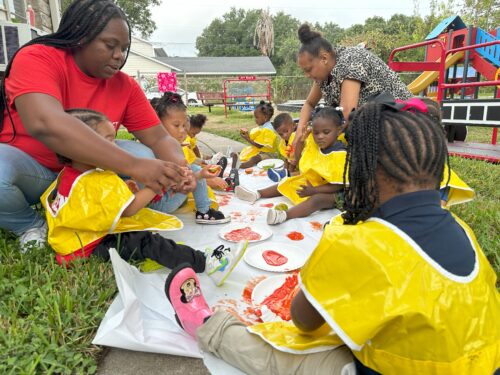Halloween in Greater Houston is more than costumes and candy, it’s a chance to support your child’s emotional development, social learning, and family bonding. For toddlers, this spooky season can be both exciting and overwhelming. That’s why Collaborative for Children is here to help families navigate Halloween with confidence, safety, and joy.

Toddlers experience Halloween differently than older children. Loud noises, spooky decorations, and unfamiliar social expectations can trigger big emotions. According to Transforming Toddlerhood, toddlers benefit from preparation, role play, and age-appropriate explanations to reduce anxiety and build excitement.
Collaborative for Children encourages parents to treat Halloween as a teachable moment. Through playful learning and emotional support, families can turn trick-or-treating into a developmental milestone.
Comfort is key. Choose costumes that are soft, breathable, and allow movement. Avoid masks or accessories that obstruct vision or breathing. Let your child wear the costume in advance to build excitement and reduce sensory surprises.
Do a practice run around the house or neighborhood. Role play with toys to teach phrases like “trick or treat” and “thank you.” This builds language skills and sets expectations for social behavior.
Frame Halloween as a fun celebration with costumes, decorations, and treats. Avoid scary imagery and focus on silliness and joy. Books like Spooky Pookie or Little Blue Truck’s Halloween can help toddlers understand the holiday in a friendly way.
According to The Everymom, Halloween safety starts with preparation and communication. Here are essential tips for keeping toddlers safe:
– Go out before dark: Early evening is best for visibility and avoiding crowds.
– Use reflective gear: Add light-up bracelets or reflective tape to costumes.
– Serve dinner first: A full belly helps prevent sugar crashes and meltdowns.
– Inspect candy: Remove choking hazards and check for tampering.
– Plan transportation: Use strollers or wagons to keep tired toddlers comfortable.
Collaborative for Children recommends using these safety practices as part of your child’s learning experience. Talk about why visibility matters or how to cross streets safely because these are foundational life skills.
Halloween doesn’t have to be a sugar overload. Experts from Happiest Baby suggest setting limits without demonizing candy. Use the moment to build trust and teach moderation.
And remember: toddlers may only last a few houses before they’re done. That’s okay. Focus on creating positive memories, not perfection.
In Greater Houston, Collaborative for Children provides resources that go far beyond Halloween. Our Centers of Excellence offer certified child care with STEAM-based curriculum, and our Collab-Lab mobile classroom brings early learning directly to families.
We help parents turn everyday moments, like trick-or-treating, into opportunities for growth. Through certified early childhood education training, family engagement, and developmental support, we’re building a community of advocates, educators, and dreamers.

Most toddlers can begin trick-or-treating around age 2 or 3, with adult supervision and a short route.
Use books, role play, and gentle explanations to make Halloween feel fun and safe. Avoid scary decorations and loud environments.
We provide certified child care referrals, parenting education, mobile learning labs (The Collab-Lab), and STEAM-based curriculum support for children ages 0–5.